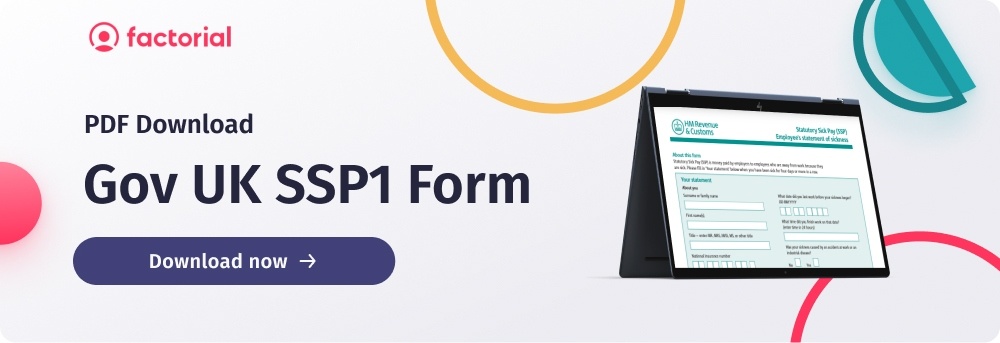Getting sick is an inevitable part of life. Managers should understand their obligations when it comes to supporting their employees. In the UK, employees can claim statutory sick pay (SSP) if they cannot work due to sickness. For both employers and employees, it is important to be aware of the laws surrounding sick leave in the UK. In this article, we’ll cover employee entitlements, statutory sick pay and how to build an effective sickness absence policy.
Sick Leave Legislation
Employees who are ill can take time off in the UK. If the illness lasts longer than 7 days (including non-working days like weekends or bank holidays), they must prove it to their employer with a sick note, also known as a ‘fit note’. This must be from a GP, hospital doctor, registered nurse, occupational therapist, pharmacist or physiotherapist.
If a fit note says the person ‘may be fit for work’, employers should talk to them about reasonable adjustments that could support the employee to return to work. If they can’t come to an agreement, the employee should be viewed as ‘not fit for work’. Employers should engage with employees on reasonable adjustments that can aid their return to work, such as modified hours, the possibility of working from home, or changes to duties that take their condition into account.
A fit note isn’t required if an employee is off sick for 7 days or less, but they must confirm they’ve been sick when they return. This is referred to as ‘self-certification’ and could mean filling out a form or written explanation detailing the illness – whichever way the employer would prefer.
Sick leave and holidays
Understanding how sick leave works alongside holidays is an important part of sick leave management and should be outlined in your sick leave policies. If sick leave overlaps with paid holiday, they can take this as sick leave instead. Employees can also accrue their statutory holiday entitlement if they’re off sick, meaning they can carry over unused holidays into the next holiday period. This means that if sick leave overlaps with holiday time, the employee is still entitled to take their holiday leave at a later date, ensuring they don’t lose out on their full entitlement.
If an employee doesn’t meet the requirements for sick pay, they can use their paid holiday days to take time off instead. On the other hand, employers cannot force them to take annual leave if they are eligible.
📌 Read our in-depth guide to employee absences to track sick leave effectively.
How Long Can You Be on Sick Leave Before Dismissal?
Sometimes, long-term sick leaves can be extended beyond the standards, and the company needs to consider dismissing an employee due to illness. Employers should make adjustments to meet their needs and try their best to make working possible for their employee. Carrying out an occupational health assessment can help to understand the requirements.
Although there are no strict rules on when to dismiss an employee, the government provide guides to understand what’s considered a fair dismissal.
Company Sick Pay Eligibility
If an employee is sick and can’t go to work, employees are legally entitled to claim paid statutory sick pay from the fourth day they are off sick. They must be paid for all of their sick days apart from those first three unless they were given SSP within the 8 weeks prior to this which also included this 3-day ‘wait’ period.
To be eligible for Statutory Sick Pay, the government has set certain conditions:
- The employee must earn at least £123 per week.
- Have done at least some work for you or your company/be classed as an ’employee’.
- Have been at least 4 consecutive days sick.
On the other hand, the employee won’t be eligible if receiving other Statutory Pay such as Statutory Maternity Pay.
An employee must also notify their employer before their company deadline. If there is no deadline, then within 7 days is legally allowed.
Statutory Sick Pay (SSP) Amount UK
Employers in the UK are expected to pay at least the minimum Statutory Sick Pay in 2023 (SSP rate). For this reason, companies should ensure they have a clear sickness and absence policy in place. By setting these rules, employers can put procedures in place for ill health at work and quickly call out unacceptable absences.
How Much Sick Pay are Employees Entitled?
Effective April 2024, employers are legally obliged to pay a minimum of £118.50 each week of Statutory Sick Pay (SSP) for up to 28 weeks if an employee can’t work due to ill health. This is the most up to date SSP rate. These sick pay rules apply to any eligible employee. Employers should pay this alongside usual wages. As a reminder, for an employee to be eligible for SSP, they must adhere to these conditions:
- Earn at least £123 per week.
- Is considered an ’employee’ or have done work for your business.
- Has been sick for 4 consecutive days.
Employers can’t pay less than this but can pay more if they offer an occupational sick pay scheme, also known as discretionary sick pay. This should be outlined in each employment contract and is usually offered to those that have completed probation. Companies can set different sick pay schemes, but the amount can’t be less than the SSP.
Calculating Sick Pay
Although the government has minimum statutory sick pay amounts, you could also consider increasing the pay or setting non-standardised terms and conditions. For example, employers may set the communication policy during the sickness absence. Or even set guidelines about what is deemed unacceptable during recovery time.
Before UK employees claim the benefits of statutory sick pay, the company should know in advance who is entitled and the amount they must pay. This information can usually be found within the employment contract. To simplify this process, the government offers a statutory sick pay calculator.
The tool is only valid for standard rules related to statutory pay, but remember, you can always offer more benefits to your employees. Consider offering more than the government minimum to compete in a candidate-driven market.
Personal Day Policies
Many employer now offer personal days off for mental health, also known as ‘duvet days‘. These essentially allow employees to take time off work without providing notice or a specific reason. The goal is to reduce employee stress, anxiety and burnout.
By implementing personal day policies, employers reduce the stigma surrounding mental health and encourage an open dialogue around it. This positively impacts company culture, driving employee satisfaction and retention rates.
What Should an Absence and Sickness Policy Include?
Having a fair and consistent sickness and absence policy in place is vital. It sets out what is expected of both employer and employee if time off is taken due to sickness or injury.
HR teams must be clear on the sick pay rules for their company. It has to include information on how to report an absence, what is allowed, and how to communicate updates.
Any good sickness policy must consider:
- Reporting sick leave.
- Deadlines to inform absence due to an illness.
- Need for medical evidence.
- Company sick pay (occupational sick pay if applicable).
- Return to work process.
1. How to Report a Sick Leave Absence
The company sickness policy should include clear information on who to report when the employee cannot go to work due to an illness. Most of the time, the manager is in charge of this duty. Explain how to self-certificate sickness and set the deadline before a fit note written by a doctor is needed. Outline which channels employees must go through to report this.
2. Medical Evidence (Fit Note: Self Certification Form and SSP1)
According to the law, if an employee is taking time off for up to 7 days in a row, it’s enough with a self-certifying note. Employees only need to report sickness with a note if their absence is over 7 days. Otherwise, a doctor’s fit note is required to prove the employee is not fit to work yet.
The self-certification form could also include some extra paperwork to track sick leaves, such as asking employees to fill out a statutory sick pay form (SSP1). Managing sickness absence gets tricky when you are in charge of large groups of people, but is key if employers want to measure productivity and drive growth. You can download of the government UK Statutory Sick Pay SSP1 form for free below.

3. Return to Work After Sick Leave
Employers must plan and implement effective return-to-work programmes within their sickness absence policy to support employee wellbeing. Research has shown the most important factors affecting employee recovery are:
- Self-efficacy: Increased sense of personal competence along with motivation and support in the workplace were crucial to reducing sickness absence.
- Social support: Employees who receive support from family, friends, and coworkers are more likely to recover faster.
- Job demands and decision control: High psychological job demands and low decision control proved to delay return to work. Alternatively, employees with more control and decision over their duties returned to work earlier.
Additionally, employers should consider holding return to work interviews to assess the needs of each individual employee. By doing so, you’ll be able to understand whether any reasonable adjustments are needed.
Benefits of a Sick Leave and Pay Policy
Effective sick leave management, sick leave policies and sick pay policies have many benefits, including:
- Encourages Employee Wellbeing: By providing rules relating to reporting absences and the process for return-to-work, the policy ensures that employees receive the necessary support and resources to recover effectively.
- Enhances Productivity: A well-defined absence and sickness policy helps minimise the disruption caused by employee absences and ensures that management can promptly address absence issues and arrange for suitable cover or redistribute workload.
- Promotes Fairness and Consistency: Having guidelines on notification requirements, documentation, and return-to-work protocols means employees are treated fairly. This eliminates the potential for favouritism or misunderstandings.
- Reduces Absence Abuse: By defining the process for reporting absences, requiring appropriate documentation and medical evidence, support allowance, sick pay schemes, and implementing a system for monitoring and reviewing absences, organisations can clamp down on employees from taking unauthorised or excessive time off work.
- Legal Compliance: A comprehensive absence and sickness policy helps companies meet their legal obligations, such as providing reasonable accommodations for employees with disabilities, adhering to leave entitlements, and maintaining accurate records.
Recording Sickness Absence with Factorial
Sick leave management can impact your employee’s recovery time, mental health, and productivity. HR managers and people teams can do a lot to help their employees recover and get back to work.
Through the use of HR Software, like Factorial, it’s easy to manage sick leave effectively. HR leave management software helps companies to automate their HR processes so that they can focus on employees rather than paperwork. From sick leave to time off, Factorial can help companies to automate, communicate, and manage tasks.
UK Sick Leave FAQs
How long can an employee be on sick leave before dismissal is considered?
While there is no fixed limit when it comes to sick leave, employers should be regularly reviewing long-term sickness absences and reasonable adjustments should be considered. Employers should consult with a solicitor to review legal guidelines and undergo occupational health assessments before making any dismissal decisions.
What are the legal requirements for sick leave in the UK?
Employers must pay their employees their statutory sick pay (SSP) if they meet the criteria, such as earning at least £123 per week and are unable to work due to illness for at least four consecutive days. Companies may have additional sick pay beyond the statutory minimum.
How does sick leave work in the UK?



